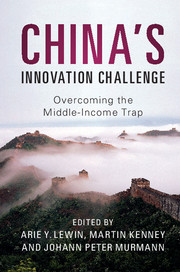Book contents
- China’s Innovation Challenge
- China’s Innovation Challenge
- Copyright page
- Contents
- Figures
- Tables
- Contributors
- Preface
- 1 China’s innovation challenge
- 2 New structural economics
- 3 Impact of China’s invisible societal forces on its intended evolution
- 4 The road ahead for China
- 5 Innovation and technological specialization of Chinese industry
- 6 China’s political economy
- 7 Transforming China’s IP system to stimulate innovation
- 8 Building the innovation capacity of SMEs in China
- 9 Who benefits when MNEs partner with local enterprises in China?
- 10 Advantages and challenges for Chinese MNEs in global competition
- 11 Emerging trends in global sourcing of innovation
- 12 Why is China failing to leapfrog India’s IT outsourcing industry?
- 13 Barriers to organizational creativity in Chinese companies
- 14 Institutional and cultural contexts of creativity and innovation in China
- 15 Reframing research for cross-cultural management
- 16 China’s innovation challenge
- Bibliography
- Index
- References
3 - Impact of China’s invisible societal forces on its intended evolution
Published online by Cambridge University Press: 05 April 2016
- China’s Innovation Challenge
- China’s Innovation Challenge
- Copyright page
- Contents
- Figures
- Tables
- Contributors
- Preface
- 1 China’s innovation challenge
- 2 New structural economics
- 3 Impact of China’s invisible societal forces on its intended evolution
- 4 The road ahead for China
- 5 Innovation and technological specialization of Chinese industry
- 6 China’s political economy
- 7 Transforming China’s IP system to stimulate innovation
- 8 Building the innovation capacity of SMEs in China
- 9 Who benefits when MNEs partner with local enterprises in China?
- 10 Advantages and challenges for Chinese MNEs in global competition
- 11 Emerging trends in global sourcing of innovation
- 12 Why is China failing to leapfrog India’s IT outsourcing industry?
- 13 Barriers to organizational creativity in Chinese companies
- 14 Institutional and cultural contexts of creativity and innovation in China
- 15 Reframing research for cross-cultural management
- 16 China’s innovation challenge
- Bibliography
- Index
- References
- Type
- Chapter
- Information
- China's Innovation ChallengeOvercoming the Middle-Income Trap, pp. 56 - 86Publisher: Cambridge University PressPrint publication year: 2016
References
- 5
- Cited by



